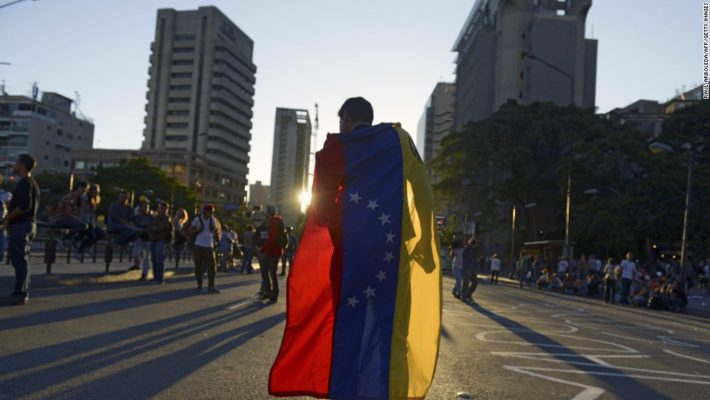Dead, wounded, hundreds of detainees. The brutal violence with which the police and the National Guard have suppressed protest demonstrations throughout the country clearly illustrates Venezuela’s touchy conjuncture. The institutional crisis seems to have put President Nicolas Maduro’s government against the wall. Those who came to think however that the current government’s end is just around the corner would be very wrong. Wrong also would be those who think that the presence of thousands of Venezuelans protesting daily on the streets, and international pressure —which is gradually becoming isolation—, would be enough to bring about the changes that the country needs and demands. There is a feeling that the end of the «Chavista» era would be slowly brewing from within the same government.
Paradoxes and inconsistencies. Venezuela is the country of great contradictions. Contradictions that President Maduro’s government tries to hide through the media siege he has imposed on the population. Censorship and self-imposed censorship in the media —mostly «Chavista» or aligned with power for convenience. Alarming news, falsehoods and endless speculation in social networks, to confuse citizens. It is difficult to chart the divide between the lies and the truth. Through information-disguised propaganda the origin of the problems that the country lives may be hidden, but not the effects though; and these will be felt inevitably in the coming months, as experts in the field agree. The consequences: discontent in the most humble neighborhoods; in that portion of the population still believing in the «Socialism of the 21st Century»; the invention of the late President Chavez, who never knew how to give it true content.
The Venezuelan crisis is nourished by contradictions within “Chavismo”. President Maduro’s government does not miss an opportunity to attack the United States, and blame the big capital for a purported «economic war» that intends to bring the «revolution» to its knees; but, just like the great capital it criticizes and condemns, through Citgo Petroleum —a subsidiary of the holding company PDVSA—, the Venezuelan government makes juicy donations, of more than half a million dollars, to the committee organizing Donald Trump’s American presidency swearing-in ceremony. The donations of Citgo —a subsidiary that was mortgaged to guarantee a Russian loan of some 1.6 billion dollars—, were far superior to those made by Pepsi, Ford and Google.
Another paradox. In spite of the terrible relations characterizing the «Chavista” government —of almost two decades— with the United States, Venezuela, placed among its six most important suppliers, continues to sell oil to the northern colossus.
Venezuelan economy depends 90% on «black gold» and, with the barrel selling for less than 50 dollars, it begins to lack resources sufficient to cover Venezuelans basic needs. Is there a danger of default? Yes and no. After disbursing around two billion dollars to pay part of its external obligations, there is too little left in the coffers of President Maduro’s government to import what the country used to produce before the «revolution».
The government now seems to be at a crossroads: to continue paying off its growing debt, or to import consumer goods and sell them —at political prices— through a parallel food-distribution system of “mercados populares” (popular markets), “Comunas” (communes) or the “Comité Local de Abastecimiento y Producción” (Local Supply and Production Committee).
President Maduro seems to have reached the end of the road. Were he to pay debts maturing this year and the next one, he would lack resources to meet the basic needs of the population; and, as the saying goes: «Where there is hunger, love does not last». On the other hand, if he were to import the goods to appease Venezuelans hunger, he would lack the resources to honor the government’s external obligations. The default would be unavoidable. No matter what his next move will be, at the end he loses.
In short, the opposition, without leaving the streets, needs only be patient to win by checkmate.
Photo Credits: Raul Alborela


